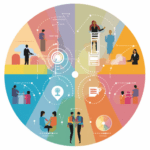
The use of data in shaping LGBTQ+ rights and policy has led to increased visibility, a better understanding of the community’s unique challenges, and more inclusive policy decisions, but data collection and privacy concerns remain crucial issues.

The Impact of Data on LGBTQ+ Rights and Policy
Hello, Datatunnel listeners! Welcome back to another episode of “Data Politics at Datatunnel.” I’m your host, Fede, and today we’re discussing the impact of data on LGBTQ+ rights and policy. Joining me are my co-hosts, Val and Alan. Val will provide insights on the technical aspects of data collection and analysis, while Alan will discuss the broader socio-political context.
Fede: Alan, let’s start with you. How has data played a role in shaping LGBTQ+ rights and policy?
Alan: Fede, data has been critical in increasing visibility and understanding of the LGBTQ+ community. By collecting data on experiences, challenges, and disparities faced by LGBTQ+ individuals, we can highlight areas where policy intervention is needed and measure the impact of those interventions.
Val: That’s right, Alan. Data has played a key role in identifying and addressing issues such as health disparities, discrimination, and violence against LGBTQ+ individuals. This information helps drive policy changes that protect and promote the rights of this community.
Fede: Val, can you give us some examples of data-driven initiatives that have made a difference in LGBTQ+ rights and policy?
Val: Sure, Fede. One example is the inclusion of sexual orientation and gender identity questions in national surveys, such as the US Census and the National Survey on Drug Use and Health. This data helps identify disparities in areas such as income, education, and mental health, which can then inform policies aimed at reducing those disparities. Another example is the use of data to track hate crimes against LGBTQ+ individuals, leading to better-targeted interventions to prevent and address such crimes.
Alan: It’s important to note, though, that there are challenges and limitations in using data to shape LGBTQ+ rights and policy. For instance, there may be underreporting due to fear of discrimination or stigma, which can lead to gaps in our understanding of the community’s needs.
Val: Additionally, privacy concerns are a significant issue when collecting data on LGBTQ+ individuals. It’s crucial to ensure that sensitive information is handled responsibly and securely to protect people’s privacy and prevent potential harm.
Fede: Thank you, Val and Alan, for your insights on the impact of data on LGBTQ+ rights and policy. In summary, data has played a crucial role in increasing visibility, understanding challenges, and driving more inclusive policy decisions. However, it’s essential to address data collection challenges and prioritize privacy and security when handling sensitive information.
If you have thoughts on this topic or suggestions for future episodes, feel free to reach out to us at Datatunnel. And don’t forget to follow us on LinkedIn and Twitter for more insights on data politics. Thanks for listening!